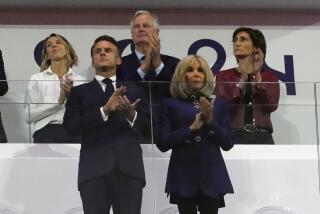Ramaphosa sworn in for a second term as South Africa’s president

- Share via
JOHANNESBURG — Cyril Ramaphosa was sworn in for a second term as South Africa’s president on Wednesday in a ceremony in the administrative capital, Pretoria, after his reelection with the help from a coalition of parties, a first in the country’s 30-year rule.
Ramaphosa is now set to appoint a Cabinet in a new coalition government after his African National Congress party lost its parliamentary majority in an election last month. He was reelected president by lawmakers on Friday after the main opposition party and a smaller third party joined the ANC in an agreement to co-govern Africa’s most industrialized economy.
He will have to guide the first coalition government in which no party has a majority. At least three parties will make up what the ANC is calling a government of national unity, with more invited to join.
Ramaphosa was administered the oath of office in a public ceremony at the Union Buildings, the seat of government, by Chief Justice Raymond Zondo.
The ANC party that freed South Africa from apartheid loses its 30-year majority in landmark election
The African National Congress party lost its parliamentary majority in an election that puts South Africa on a new political path since apartheid ended.
King Mswati III of Eswatini, Nigerian President Bola Tinubu, Zimbabwe President Emerson Mnangagwa and former Kenyan Prime Minister Raila Odinga were among many dignitaries who attended the inauguration ceremony as Ramaphosa begins what promises to be a tough final term in office.
The ceremony included a 21-gun salute by the presidential guard and a flyover by the South Africa Air Force over the Union Buildings. South African musicians and cultural dancers entertained thousands of citizens who attended the swearing-in.
Addressing the nation, Ramaphosa said that the people had spoken and their will would be adhered to.
“The voters of South Africa did not give any single party the full mandate to govern our country alone. They have directed us to work together to address their plight and realize their aspirations,” he said.
Ramaphosa said the people of South Africa “have also been unequivocal in expressing their disappointment and disapproval of our performance in some of the areas in which we have failed them.” He also recognized the society “remains deeply unequal and highly polarized,” which could ”easily turn into instability.”
South African lawmakers reelect President Cyril Ramaphosa after his African National Congress party made a coalition deal with its main opposition.
“The lines drawn by our history, between black and white, between man and woman, between suburbs and townships, between urban and rural, between the wealthy and the poor, remain etched in our landscape,” he said.
He also promised that the new government would create new work opportunities to face crippling unemployment as well as work on providing people with basic services such as housing, healthcare and clean water.
While Ramaphosa’s words were meant to reassure an already economically strained population, the new administration could prove challenging to lead.
It is made up of parties that are ideologically opposed and don’t see eye to eye on how to address the country’s many challenges, including land redistribution policies and proposed solutions to the electricity crisis, as well as their contrary views on affirmative action.
South Africa’s election will determine how weary the country has become of the African National Congress party, which has been in power since the end of apartheid.
Major players such as the Democratic Alliance and the Inkatha Freedom Party have already joined the coalition, and others such as the Patriotic Alliance, the GOOD Party and the Pan Africanist Congress are expected to follow.
However, the third-largest party, led by former President Jacob Zuma, the uMkhonto weSizwe Party, and the leftist Economic Freedom Fighters party have refused to be part of it.
It is unclear when the formation of the new Cabinet would be announced.
Magome writes for the Associated Press.
More to Read
Sign up for Essential California
The most important California stories and recommendations in your inbox every morning.
You may occasionally receive promotional content from the Los Angeles Times.













